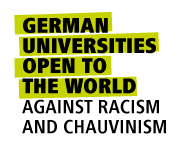
Newsarchiv: Creating knowledge since 1502
Jahr 2022
Preise und Urkunden werden verliehen – Großes Frühjahrskonzert findet als Benefizkonzert statt
Die MLU veranstaltet für ihre Nachwuchswissenschaftlerinnen und Nachwuchswissenschaftler am Freitag, 29. April 2022, ab 15 Uhr eine Festveranstaltung in der Aula des Löwengebäudes. Promovenden und Habilitanden erhalten ihre Urkunden. Weiterhin werden die Luther-Urkunden und die dotierten Universitätspreise für herausragende Arbeiten vergeben. Ab 20 Uhr folgt dann das Große Frühjahrskonzert in der Händel-Halle, das allen Besucherinnen und Besuchern offensteht und gemeinsam von den Ensembles der MLU gestaltet wird. Es findet als Benefizkonzert für die Ukraine statt. Die Karten dafür sind ab sofort im Marktschlösschen erhältlich.
News
Alternative Konzepte für den Besitz und die Bewirtschaftung von Ackerböden haben Vorteile für Landwirte und die Gesellschaft. Das zeigt ein neuer Forschungsbericht der MLU, den das Bundesministerium für Ernährung und Landwirtschaft (BMEL) kürzlich veröffentlicht hat. Die Studie liefert erstmals einen Überblick über die vielfältigen Konzepte, mit denen gemeinschaftliches Eigentum und ein gemeinwohlorientiertes Management von Äckern und Weiden angestrebt werden.
Neues Projekt der Uni Halle: Familienforschung mit der Einwegkamera
Familienfeste, Traditionen, Glauben: Die MLU untersucht, was Familien in den neuen Bundesländern ausmacht, wie politische oder kulturelle Themen darin verhandelt werden und welche Rolle Traditionen und Werte für sie spielen. Neben Interviews kommt dabei auch ein in der Forschung ungewöhnliches Werkzeug zum Einsatz: Mit Hilfe von Einwegkameras sollen die Teilnehmer*innen ihren Alltag in der Familie dokumentieren.
News
Auch in diesem Jahr haben Bürgerinnen und Bürger die Möglichkeit, im Rahmen eines europaweiten Citizen Science-Projekts die Forschung zu unterstützen. Dafür müssen Interessierte Echte Schlüsselblumen in ihrer naturnahen Umgebung suchen, bestimmte Blütenmerkmale notieren und ihre Beobachtungen in eine digitale Datenbank eintragen. Ziel ist es, mehr über den Bestand und die Lebensbedingungen der geschützten Art zu erfahren.
News
Einen umfangreichen Überblick über das deutsche Aufenthaltsgesetz gibt eine neue Videoreihe, die Jurist*innen der Martin-Luther-Universität gemeinsam mit dem Deutschen Roten Kreuz erstellen. Darin werden anhand von konkreten Beispielen verschiedene Facetten und Aspekte des Migrationsrechts systematisch behandelt. Die Videos sind auf der Plattform des Informationsverbunds Asyl & Migration frei verfügbar.
Hilfe für die Ukraine: Zahlreiche Spenden bei Benefizkonzerten
Der 9. und 10. März standen an der Universität ganz im Zeichen der Solidarität mit der Ukraine. Bei zwei Benefizkonzerten wurden Spenden für die Vereine „Hilfe für ausländische Studierende“ (HauS) an der MLU und das Slawia Kulturcentrum e.V. in Halle gesammelt. Das Onlinemagazin "campus halensis" berichtet ausführlich über die bewegenden Konzertabende.
„In aller Munde“ - Universitätsgottesdienste im Sommersemester starten am 4. April
Mit dem Semestereröffnungsgottesdienst beginnt am Montag, 4. April 2022, 18 Uhr, in der halleschen Marktkirche die neue Reihe der Universitätsgottesdienste der Martin-Luther-Universität Halle-Wittenberg. Sie steht im Sommersemester 2022 unter dem Motto "In aller Munde". Zum Auftakt werden Spenden zur Unterstützung von Hilfsangeboten für die Ukraine und Geflüchtete gesammelt.
Botanischer Garten startet am 1. April in die Saison
Der Botanische Garten der Martin-Luther-Universität Halle-Wittenberg (MLU) hat ab Freitag, 1. April 2022, wieder geöffnet. Besucherinnen und Besucher können dann zu den gewohnten Öffnungszeiten einen Rundgang durch die Außenanlagen machen. Aufgrund von Bauarbeiten können nicht alle Teile des Botanischen Gartens besucht werden. Die Gewächshäuser bleiben zunächst geschlossen.
Wieder in Präsenz: Uni Halle lädt am 2. April zum HIT 2022 auf den Universitätsplatz ein
Am Sonnabend, 2. April 2022, findet der Hochschulinformationstag (HIT) der Martin-Luther-Universität Halle-Wittenberg (MLU) wieder vor Ort auf dem Universitätsplatz und in den angrenzenden Gebäuden statt. Schülerinnen und Schüler sowie deren Eltern und Bachelorabsolventinnen und -absolventen können sich zwischen 10 und 15 Uhr zum Studienangebot und allen Themen rund um das Studium an der MLU beraten lassen.
Public transport: AI assesses resilience of timetables
A brief traffic jam, a stuck door, or many passengers getting on and off at a stop - even small delays in the timetables of trains and buses can lead to major problems. A new artificial intelligence could help designing schedules that are less susceptible to those minor disruptions. It was developed by a team from the Martin Luther University Halle-Wittenberg, the Fraunhofer Institute for Industrial Mathematics ITWM and the University of Kaiserslautern. The study was published in "Transportation Research Part C: Emerging Technologies".
Blueprint for proteins: How the mRNA gets its final shape
Proteins need to interact in a complex manner for a so-called "messenger RNA" (mRNA) to be created in human cells from a precursor molecule. mRNA provides a blueprint for proteins; the first vaccines against the coronavirus are also based on mRNAs. A team from Martin Luther University Halle-Wittenberg (MLU) and the Max Planck Institute (MPI) of Biochemistry in Martinsried has discovered how an essential final step in the production of mRNA precisely works. The study was published in "Genes & Development".
Scientists show how artificial intelligence can help to study protein complexes
Researchers at Martin Luther University Halle-Wittenberg (MLU) and the European Molecular Biology Laboratory in Hamburg have developed a new method for studying proteins. The team has succeeded in developing an AI-based method for analysing cryo-electron microscopy data. In future, this will enable several protein complexes to be simultaneously examined directly in cells. The team presents its work in the scientific journal "Structure".









